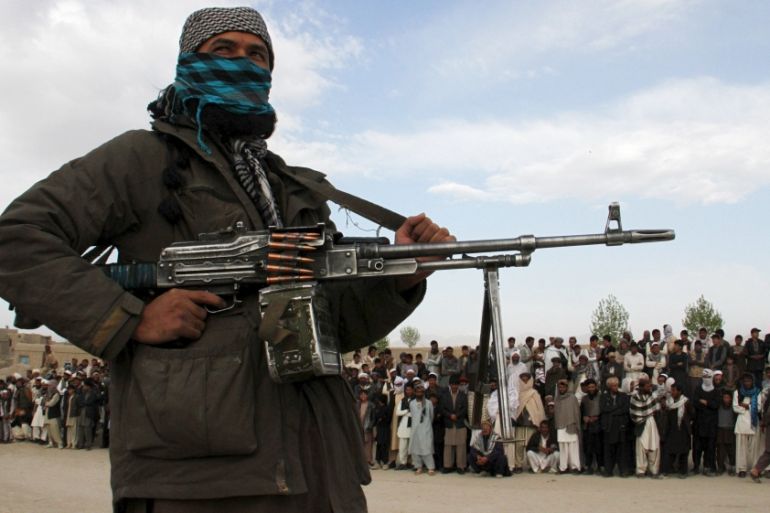Unpredictable peace: Taliban’s internal instability
If Taliban’s leadership wants to stay in Pakistan, they will have to participate in the Afghanistan peace process.

Despite efforts by two sets of mediators, the dispute over the issue of succession is still unresolved even after more than a week since the Taliban belatedly conceded the death of their supreme leader, Mullah Omar.
The generally disciplined Taliban movement is increasingly facing anarchy in its ranks.
Keep reading
list of 4 itemsPhotos: Tourist numbers up in post-war Afghanistan
Taliban ban on girls’ education defies both worldly and religious logic
Afghanistan calls for ‘respect’ after Cricket Australia snub
In my attempts to fully understand and be able to fully communicate all sides of this issue, I conducted a number of personal interviews with both supporting and dissenting figures of the Taliban movement and Mullah Akhtar Mansoor’s leadership.
RELATED: Dead or alive, Mullah Omar will not matter
In an interview with Mansoor’s aides, supporters of the new “emir” of the Taliban movement have accused Mansoor’s opponents of remaining inactive all these years, while the group struggled to survive after being ousted from power in late 2001.
In an interview with leaders of an anti-Mansoor faction, they responded by alleging that he hurriedly got himself chosen by the pliant, 18-member leadership council – the rahbari shura – when Taliban members were still in mourning for Omar.
Naming the new Taliban leader
The anti-Mansoor faction is demanding the convening of a larger shura of pro-Taliban religious scholars, field commanders, and notables to decide the succession and name the new Taliban leader.
According to my personal sources within the Taliban and pro-Taliban religious circles, the mediators are pro-Taliban religious figures, but not all are neutral – an essential requirement to be able to win the trust of the parties to the dispute.
|
|
| What does death of Mullah Omar mean for Taliban and Afghanistan? |
Instead of pooling their resources and influence, the mediators are working separately in three groups and in the process, they’re causing confusion.
The anti-Mansoor faction, which is weaker in that it lacks influential members, has given authority to one set of mediators and pledged to abide by whatever verdict it delivers with the sole condition that this should be based on Islamic law.
After an interview I conducted with Mansoor’s aides, it is clear that the Mansoor group is unwilling to give authority to the mediators.
In fact, the group quickly arranged meetings of its supporters across Afghanistan and Pakistan to seek “baiyat” (pledge of loyalty) for Mansoor in order to wrap up the issue of succession and pre-empt any adverse move by the opposition.
Pledging loyalty
According to another interview with the spokesperson for the anti-Mansoor faction and Mullah Omar’s only surviving brother, Mullah Abdul Manan Niazi, these meetings were also used to offer prayers for Omar to attract more people, a move criticised by the anti-Mansoor faction.
Mansoor’s men are presenting his appointment and their pledge of loyalty to him as a fait accompli which cannot be rolled back.
|
Mansoor neither has his predecessor Omar’s stature nor his unchallenged powers… He will have to lead by consensus and involve his shura members and military commanders in decision-making process. |
They have now taken the next step by offering positions in the Taliban set-up to opposition stalwarts, particularly to Omar’s only surviving brother, Mullah Abdul, and eldest son, Mullah Mohammad Yaqoob.
In fact, Mansoor’s biggest worry is to neutralise the family of Omar, the Taliban movement’s founder and head for 19 years, who, as the “Amirul Momineen” (commander of the faithful), enjoyed unparallelled popularity among his followers.
Omar’s family has refused to pledge loyalty to Mansoor and, instead, backed the opposition’s demand for convening a larger council meeting to decide on the issue of succession.
In an interview, Yaqoob – stated to be about 23 years old – told me he had been offered the important job of head of the Taliban military commission despite being young and inexperienced.
If Mansoor can win over Omar’s brother and son, his position as the new Taliban head will become stronger and unassailable.
However, if he fails to do so, Mansoor will maintain the title of “emir”, though his position will be deemed controversial.
Altering the course
Once firmly in the saddle, Mansoor will have to make decisions that could alter the course of the ongoing Taliban insurgency in Afghanistan.
Mansoor has neither his predecessor’s stature nor his unchallenged powers.

Unlike Omar, who was the Taliban’s “Amirul Momineen”, and therefore, the supreme leader, Mansoor is a mere “emir” with lesser powers.
He will have to lead by consensus and involve his shura members and military commanders in the decision-making process.
Mansoor will also have to go beyond his Ishaqzai Durrani tribe while making key appointments to refute allegations of nepotism.
One keenly awaited decision by Mansoor will be the future of the Afghan peace process.
Through persuasion by Pakistan, Mansoor agreed to the peace talks with Afghanistan’s unity government of President Ashraf Ghani and Chief Executive Officer Abdullah Abdullah and sent a Taliban delegation to the Pakistani hill-station of Murree for the first face-to-face meeting on July 7. However, his recent anti-peace talks statement has caused disappointment and confusion for Islamabad and Kabul, as well as for Washington and Beijing.
Bold and risky decisions
However, Mansoor’s statement should be seen in context of his ongoing efforts to consolidate his position as the new Taliban leader by seeking support of group members, particularly the fighters, who are opposed to the peace talks.
|
|
Mansoor’s earlier decision to hold negotiations with Kabul was certainly bold and risky, as he gave up the old Taliban demand that all foreign forces should be withdrawn from Afghanistan before any peace talks can take place.
This move invited criticism that Mansoor was too close to Pakistan and unable to take an independent line on key issues.
However, it is also true that he will first have to strengthen his position as the Taliban head in order to be able to persuade his field commanders and clerics to give up their opposition to the peace talks.
The recent statement by Pakistan’s Army Chief General Raheel Sharif, stating that those opposed to the Afghan peace talks are enemies of peace in the region, should be seen as a warning to all sides in the conflict, including the Taliban.
If the Taliban leadership wants to continue to stay in Pakistan, it won’t be able to ignore Islamabad’s advice to try to achieve some of its objectives through negotiations and become part of the peace and reconciliation process in Afghanistan.
RELATED: The good and bad Taliban
The peace process is still in an early and unpredictable stage and it could be spoiled by the hawks which are present in both the Afghan government and the Taliban movement.
However, it is the preferred option as the alternative is continued war in Afghanistan fuelling instability in the region, particularly in Pakistan.
Rahimullah Yusufzai is a journalist and analyst based in Peshawar, northwest Pakistan.
The views expressed in this article are the author’s own and do not necessarily reflect Al Jazeera’s editorial policy.
